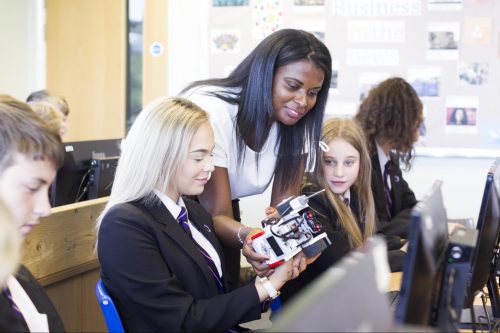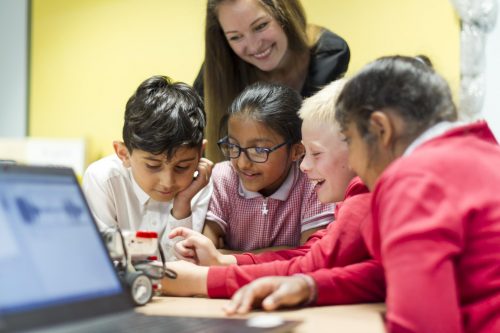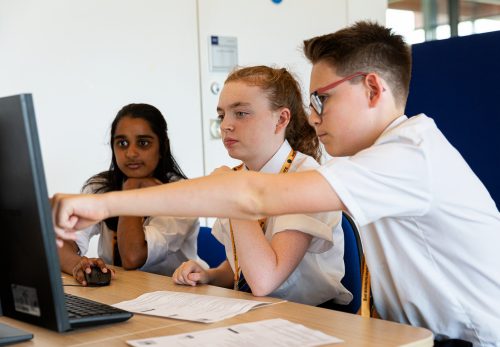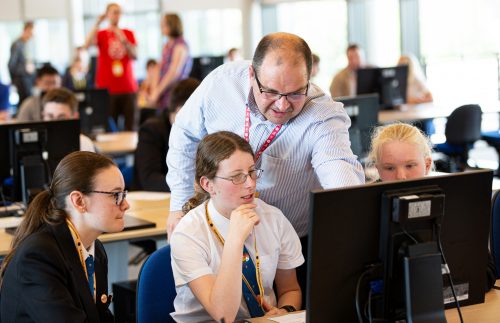After launching our Gender Balance in Computing programme this April, we have been busy recruiting for two trials within a small group of schools around England.
Today, we are opening general recruitment for the programme. This means that all primary and secondary schools in England can now take part in the upcoming trials in this landmark programme. You can register your interest here. Why not do it right now?

What we are doing, and why
Many young women don’t choose to study computing-related subjects. A variety of factors across primary and secondary education are likely to influence this, including girls feeling like they don’t belong in the subject or its community, a lack of sustained encouragement, and a lack of role models in computing when making their career choices. We are working with schools to better understand and help change this.
The Department for Education has recently funded our Gender Balance in Computing (GBIC) research programme, giving us the amazing opportunity to work with schools to investigate different approaches to engage girls in computing and to help increase the number of girls who select Computer Science at GCSE and A level.

GBIC is a collaboration between the Raspberry Pi Foundation; STEM Learning; BCS, The Chartered Institute for IT; and the Behavioural Insights Team. It is also part of the National Centre for Computing Education.
Operationally, we will lead the project together with the Behavioural Insights Team, with Apps for Good and Women in Science and Engineering (WISE) also contributing to the project. Trials will run in 2019–2022 in Key Stages 1–4, and over 15,000 pupils and 550 schools will be involved. It will be the largest national research effort to tackle gender balance in computing to date!
Which approaches are we trialling?
The different trials in this programme are related to:
- Non-formal learning
- Belonging
- Relevance
- Teaching approaches
Non-formal learning (Primary and Secondary, Jan 2020 – Mar 2020)
In the non-formal learning trial, which started in September, we seek to strengthen the links between non-formal learning and studying computing at GCSE or A level. The reason for this is that girls are often unaware that their non-formal learning about computing can help them in formal studies. Girls are also better represented in non-formal computing clubs than in formal settings where computing is taught, i.e. they are engaging with computing outside of the classroom, but not in their formal studies. So far in the non-formal learning trial, we have created specific resources for schools running Code Clubs and Apps for Good programmes which signpost the links between non-formal and formal learning of computing, and how these can lead to future career/subject choices later in the participants’ lives.
Belonging (Years 6 and 8, Sep 2020 – Jul 2021)
The belonging trial will tackle girls’ “lack of belonging” because they don’t see themselves represented in computing media coverage. To address this situation, we will work with primary and secondary schools to introduce girls and their parents to positive role models in computer science, deliver testimonials from these role models at key transition points in their education (such as while making their GCSE choices), and encourage the development of peer support networks.
Relevance (Years 6 and 8, Jan 2021 – May 2022)
The relevance trial will look at helping learners to see the real-world applications of learning computing. We will support schools to hold stimulus days that engage pupils by helping them to solve real-world problems through technology. We will also encourage pupils to develop projects that solve problems that are relevant to their local area, home, or classroom. The pupils will be able to further explore the real-world applications of computing through newly written classroom resources.
Teaching Approach (Years 6 and 8, Jan 2021 – May 2022)
The teaching approach trial is based on the idea that current approaches to teaching computing may not be fully inclusive and so may be less appealing to girls. In Key Stage 1, we will trial a “storytelling around computing” approach. In Key Stage 2 and 3, we will explore different types of teaching approaches to assess what the most effective mix is for engaging girls in the subject.
There is also an innovation trial, which we will develop based on any additional promising research pathways that emerge while the GBIC project progresses.

Join our GBIC School Network
By joining our programme, you’ll become part of our GBIC School Network.
This will give your school:
- The chance to participate in projects designed to increase girls’ engagement in computing — although designed to make computing more accessible for girls, all of our projects are designed for whole cohorts at your school to take part in, including boys
- A bi-monthly GBIC newsletter that will keep you up to date with the project and other news on addressing gender balance in computing
- Opportunities to participate in events to promote the sharing of best practice and research updates between fellow GBIC School Network schools
As part of the GBIC School Network, your school will need to:
- Identify a key contact in the school who will liaise with the GBIC School Network and our researchers at Raspberry Pi
- Send out the information and opt-out consent forms (which we will provide) to parents of pupils in the relevant year groups
- Deliver the trial materials in line with the project guides; the timeline, delivery model, and types of material will differ depending on the trial

Get involved in this landmark programme
- Register your interest in taking part
- Send this article to a colleague in a different school and invite them to register their interest
- If you’re interested in this research but can’t take part, we’d love you to sign up to our bi-monthly newsletter, and to include a link to this article in any newsletters, blog entries, or social media posts you are sharing with teachers
Your support is invaluable — together we can work to improve the gender balance in computing!
Website: LINK
